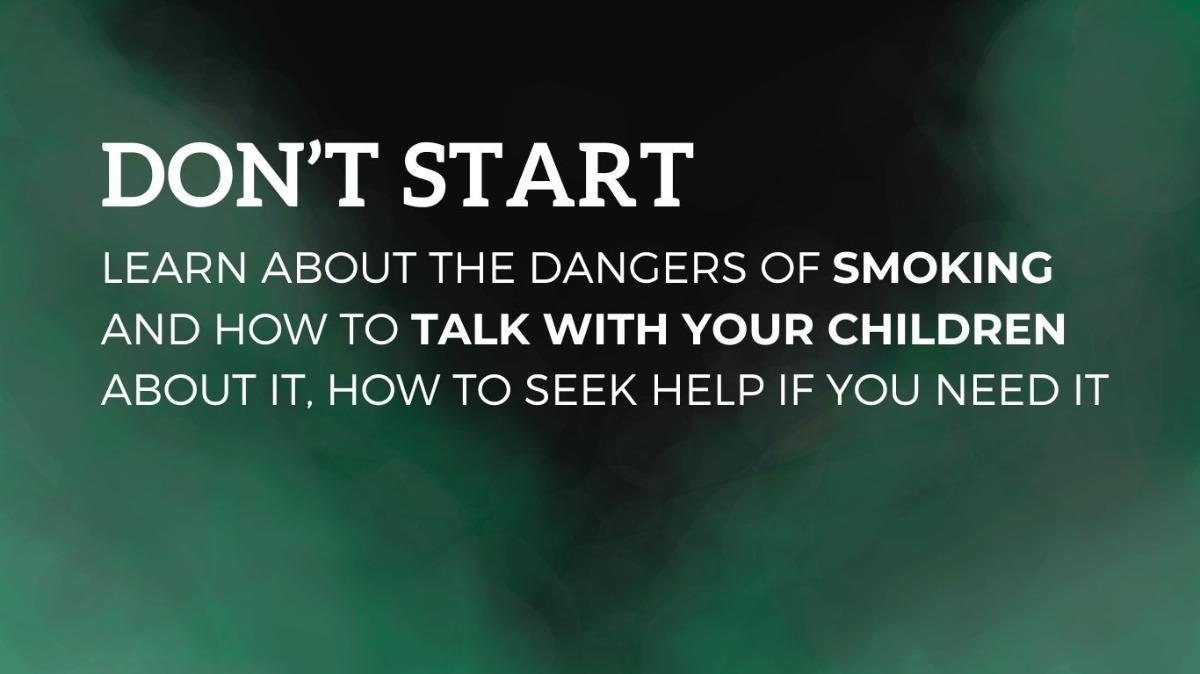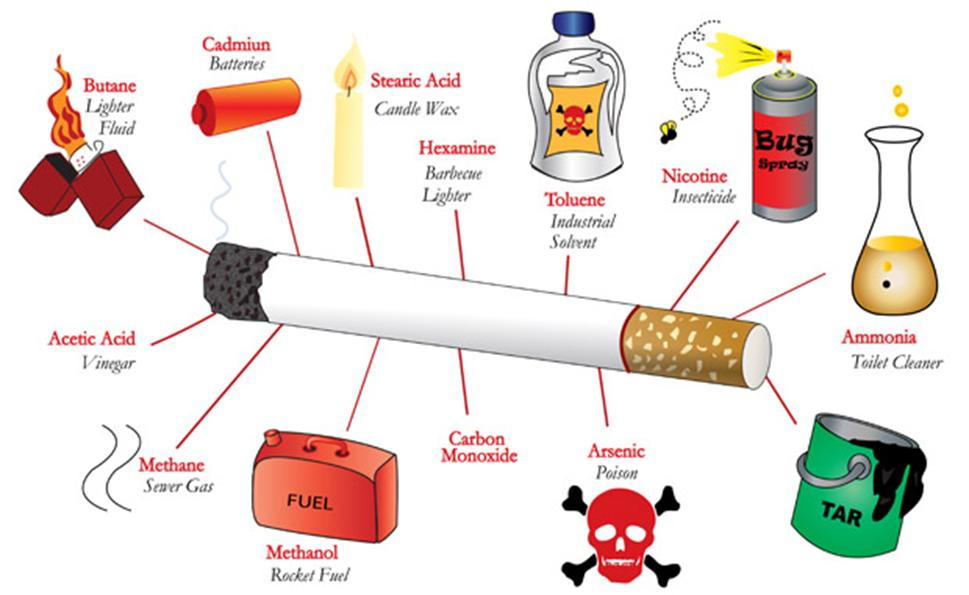Smoking

- posted: Nov. 16, 2023
Everyone should be able to name at least one harmful effect that cigarettes have on the body if you smoke. If you haven’t heard of any, here’s a few - cancer, heart disease, stroke, lung diseases, diabetes, and chronic obstructive pulmonary disease, which includes emphysema and chronic bronchitis. These are not little side effects that just go away once you wise up and quit smoking. More than 16 million Americans are currently living with a disease caused by smoking.
What’s in a cigarette?

While there are many chemicals in just one cigarette that contribute to these health issues, nicotine is what makes these products so addictive.
Why is nicotine bad?
Nicotine is a toxic substance that raises your blood pressure and spikes your adrenaline, this increases your heart rate and the likelihood of having a heart attack. Other risks include nicotine addiction, mood disorders, permanent lowering of impulse control, vulnerability to addictions. Nicotine also changes the way synapses are formed, which can harm the parts of the brain that control attention and learning. The part of the brain that's responsible for decision making and impulse control is not fully developed until after adolescence.
Nicotine is also present in other products like chewing/dipping tobacco, cigars, hookah, e-cigarettes also known as vapes. Vapes have become increasingly popular since marketing is geared to attracting the younger generation.
You might think, “I don’t have to worry about this, my child doesn’t think about smoking. They’re too young.” Please consider sitting down and having a conversation with your child and discuss the dangers anyway. In a survey conducted in 2019, 5,600 teens in Maui County showed 13.3% had tried vaping before they were 13-years old. The highest rate in Hawai'i, according to the State Department of Health.
That same survey also showed 4% of middle schoolers and 43% of high schoolers who have never vaped reported at least one of their four closest friends uses e-cigarettes. You can see how the probability of your child smoking increases.
Here are some tips when talking with your child:
- Be patient and ready to listen, avoid criticism and lecturing.
- Encourage an open dialogue with youth by discussing things that are going on in their lives.
- Don’t be direct or confrontational. Instead of asking, “Are you vaping?” or “Do you use e-cigarettes?”, ask them what they know about vaping, if they see vaping in school or among their friends. Ask them what they are hearing in the news and if they are concerned about health problems from vaping and nicotine.
- If you find out that they are vaping, stay calm. If you become upset, it is unlikely that they will continue confiding in you.
If your child needs help quitting, teens can sign up for help today for free by texting “Start my Quit” to 36072 or calling 855-891-9989. Parents, guardians and health care providers can also call or visit MyLifeMyQuit.com for more information.
Learn more about vaping by talking with other parents, educators and medical professionals or from the resources listed below.
Resources: https://mauinow.com/2021/09/09/survey-finds-maui-has-highest-rate-of-teen-vaping-in-state/; https://www.cdc.gov/tobacco/basic_information/health_effects/index.htm; https://escapethevapehi.com/; https://www.hopkinsmedicine.org/health/wellness-and-prevention/5-truths-you-need-to-know-about-vaping; https://e-cigarettes.surgeongeneral.gov/knowtherisks.html; https://livinghealthy.hawaii.gov/tobacco-free/vaping/; https://hawaii.mylifemyquit.org/index
Image resource: https://quittrainblog.com/chemicals-in-cigarettes/

- posted: Nov. 16, 2023
Everyone should be able to name at least one harmful effect that cigarettes have on the body if you smoke. If you haven’t heard of any, here’s a few - cancer, heart disease, stroke, lung diseases, diabetes, and chronic obstructive pulmonary disease, which includes emphysema and chronic bronchitis. These are not little side effects that just go away once you wise up and quit smoking. More than 16 million Americans are currently living with a disease caused by smoking.
What’s in a cigarette?

While there are many chemicals in just one cigarette that contribute to these health issues, nicotine is what makes these products so addictive.
Why is nicotine bad?
Nicotine is a toxic substance that raises your blood pressure and spikes your adrenaline, this increases your heart rate and the likelihood of having a heart attack. Other risks include nicotine addiction, mood disorders, permanent lowering of impulse control, vulnerability to addictions. Nicotine also changes the way synapses are formed, which can harm the parts of the brain that control attention and learning. The part of the brain that's responsible for decision making and impulse control is not fully developed until after adolescence.
Nicotine is also present in other products like chewing/dipping tobacco, cigars, hookah, e-cigarettes also known as vapes. Vapes have become increasingly popular since marketing is geared to attracting the younger generation.
You might think, “I don’t have to worry about this, my child doesn’t think about smoking. They’re too young.” Please consider sitting down and having a conversation with your child and discuss the dangers anyway. In a survey conducted in 2019, 5,600 teens in Maui County showed 13.3% had tried vaping before they were 13-years old. The highest rate in Hawai'i, according to the State Department of Health.
That same survey also showed 4% of middle schoolers and 43% of high schoolers who have never vaped reported at least one of their four closest friends uses e-cigarettes. You can see how the probability of your child smoking increases.
Here are some tips when talking with your child:
- Be patient and ready to listen, avoid criticism and lecturing.
- Encourage an open dialogue with youth by discussing things that are going on in their lives.
- Don’t be direct or confrontational. Instead of asking, “Are you vaping?” or “Do you use e-cigarettes?”, ask them what they know about vaping, if they see vaping in school or among their friends. Ask them what they are hearing in the news and if they are concerned about health problems from vaping and nicotine.
- If you find out that they are vaping, stay calm. If you become upset, it is unlikely that they will continue confiding in you.
If your child needs help quitting, teens can sign up for help today for free by texting “Start my Quit” to 36072 or calling 855-891-9989. Parents, guardians and health care providers can also call or visit MyLifeMyQuit.com for more information.
Learn more about vaping by talking with other parents, educators and medical professionals or from the resources listed below.
Resources: https://mauinow.com/2021/09/09/survey-finds-maui-has-highest-rate-of-teen-vaping-in-state/; https://www.cdc.gov/tobacco/basic_information/health_effects/index.htm; https://escapethevapehi.com/; https://www.hopkinsmedicine.org/health/wellness-and-prevention/5-truths-you-need-to-know-about-vaping; https://e-cigarettes.surgeongeneral.gov/knowtherisks.html; https://livinghealthy.hawaii.gov/tobacco-free/vaping/; https://hawaii.mylifemyquit.org/index
Image resource: https://quittrainblog.com/chemicals-in-cigarettes/
Monday
8:00 am - 12:00 pm
1:15 pm - 5:00 pm
Tuesday
8:00 am - 12:00 pm
1:15 pm - 5:00 pm
Wednesday
8:00 am - 12:00 pm
Thursday
8:00 am - 12:00 pm
1:15 pm - 5:00 pm
Friday
8:00 am - 12:00 pm
1:15 pm - 5:00 pm
Saturday
Closed
Sunday
Closed